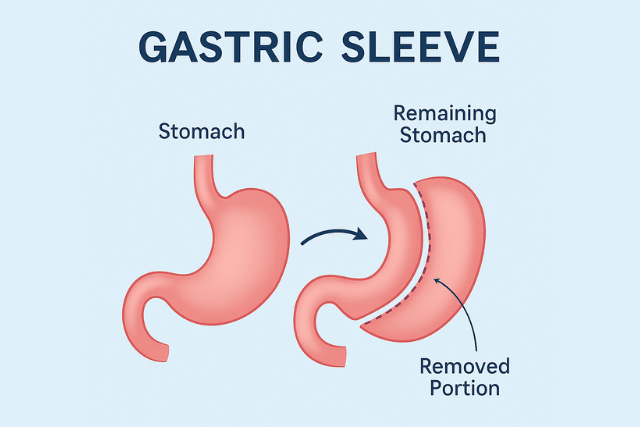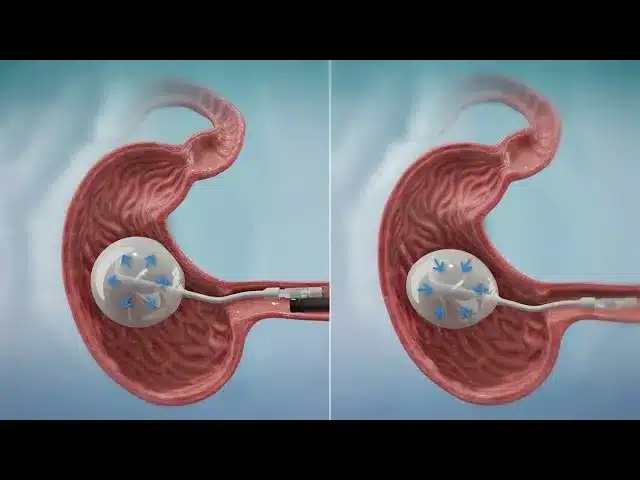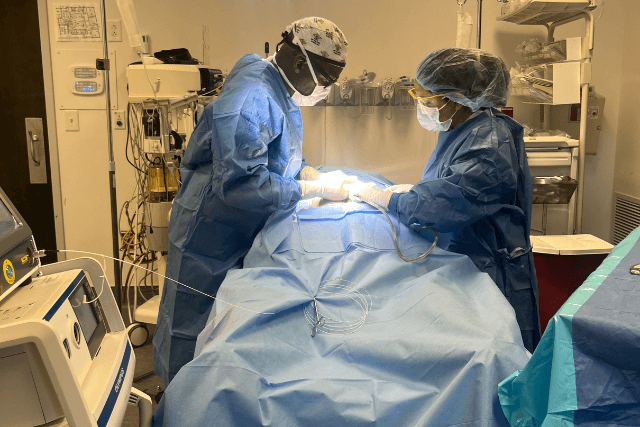Bariatric surgery refers to a variety of weight loss surgeries designed to help individuals with obesity lose excess weight. These surgeries work by altering the digestive system in some way, either by restricting the amount of food you can eat, limiting nutrient absorption, or a combination of both. Bariatric surgery can be a life-changing procedure for many people, offering an effective long-term solution to weight loss, especially for those who have not had success with traditional weight loss methods like dieting and exercise alone.
If you’re considering bariatric surgery as an option for weight loss, it’s important to understand the different types of surgeries available, their benefits, and how they might suit your individual needs. At IBI Healthcare, we offer a variety of bariatric surgery options that can help you achieve your weight loss goals. Let’s take a closer look at the various procedures we offer, how they work, and who might be a good candidate for each one.
Types of Bariatric Surgery Offered at IBI Healthcare
At IBI Healthcare, we offer a range of bariatric surgeries; moreover, each has its own benefits and characteristics. Our team of experts will help you determine the best procedure based on your health, goals, and individual circumstances. Here are the main types of bariatric surgery we provide:
1. Gastric Bypass Surgery
Gastric Bypass Surgery, also known as Roux-en-Y Gastric Bypass (RYGB), is one of the most common and well-known bariatric surgeries. Specifically, this procedure involves creating a small pouch from the top of the stomach and connecting it directly to the small intestine. As a result, the stomach’s capacity is significantly reduced, and the food bypasses a portion of the digestive tract, which limits the absorption of calories and nutrients.
Benefits of Gastric Bypass:
- Significant long-term weight loss
- Effective in treating obesity-related conditions like type 2 diabetes, sleep apnea, and hypertension
- Provides both restriction (smaller stomach size) and malabsorption (less calorie absorption)
Who is a good candidate for Gastric Bypass? Gastric bypass surgery is generally recommended for individuals who have a body mass index (BMI) of 40 or higher, or a BMI of 35 or higher with obesity-related health issues. It is also suitable for those who have not had long-term success with weight loss methods like diet and exercise.

2. Gastric Sleeve Surgery
Gastric Sleeve Surgery, also known as Laparoscopic Sleeve Gastrectomy (LSG), is a popular bariatric surgery that involves removing a large portion of the stomach to create a tube-like structure or “sleeve.” The reduced stomach size limits the amount of food you can eat and promotes feelings of fullness more quickly.
Benefits of Gastric Sleeve:
- Significant weight loss, especially in the first 12 to 18 months
- No rerouting of the intestines, making it a simpler procedure than gastric bypass
- Reduced risk of complications compared to other surgeries
Who is a good candidate for Gastric Sleeve? Gastric sleeve surgery is ideal for individuals with a BMI of 40 or higher, or those with a BMI of 35 or higher who have obesity-related health problems. It’s also suitable for patients who prefer a less invasive procedure with no intestinal rerouting.
3. Endoscopic Sleeve Gastroplasty (ESG)
Endoscopic Sleeve Gastroplasty (ESG) is a newer, minimally invasive bariatric surgery that uses an endoscopic tool to reduce the size of the stomach. The procedure involves stitching the stomach to create a smaller, sleeve-like shape, which reduces the stomach’s capacity and limits food intake.
Benefits of ESG:
- Minimally invasive with no need for incisions
- Short recovery time
- Effective for patients who want a less invasive option than traditional surgeries
Who is a good candidate for ESG? ESG is ideal for patients who have a BMI of 30 to 40 and want a less invasive procedure without the need for major surgery. It is also suitable for those who are not candidates for more traditional weight loss surgeries.

4. Gastric Balloon
The Gastric Balloon is a non-surgical procedure that involves placing a balloon inside the stomach, which is then inflated. This helps you feel fuller with smaller amounts of food, leading to weight loss. The balloon is typically left in place for about six months and is then removed.
Benefits of the Gastric Balloon:
- Non-invasive with no permanent changes to the stomach
- Short procedure time and quick recovery
- Ideal for those looking to jumpstart weight loss before committing to surgery
Who is a good candidate for the Gastric Balloon? The gastric balloon is best for individuals with a BMI of 30 to 40 who need help kickstarting their weight loss journey. It can also be used for patients who are not ready for permanent surgery but need assistance with portion control.
5. Laparoscopic Adjustable Gastric Band (LAGB)
The Laparoscopic Adjustable Gastric Band (also known as Lap Band) is a procedure in which a band is placed around the upper portion of the stomach, creating a small pouch. The band can be adjusted to control the size of the opening between the pouch and the rest of the stomach, which helps regulate the amount of food consumed.
Benefits of LAGB:
- Adjustable to allow for changes in eating habits
- No permanent changes to the stomach
- A less invasive surgery with quicker recovery time
Who is a good candidate for LAGB? LAGB is best for patients who have a BMI of 35 or higher and prefer a reversible, adjustable weight loss procedure
6. Mini Gastric Bypass Surgery
Mini gastric bypass is a simpler version of the Roux-en-Y gastric bypass. It involves creating a small stomach pouch and bypassing part of the small intestine, therefore leading to reduced food intake and calorie absorption.
Benefits of Mini Gastric Bypass:
- Shorter surgery time than traditional gastric bypass
- Effective for long-term weight loss
- Helps manage obesity-related conditions
Who is a good candidate for Mini Gastric Bypass? Patients with a BMI of 40 or higher, or a BMI of 35 with health issues, who want a shorter and simpler alternative to RYGB.
7. Laparoscopic Duodenal Switch (LDS)
LDS is a complex weight loss surgery that combines restrictive and malabsorptive techniques. Additionally, it removes a portion of the stomach and reroutes the intestines to reduce calorie absorption.
8. Single Anastomosis Duodenal Ileal Bypass (SADI)
SADI is a variation of the duodenal switch that simplifies the procedure while maintaining effective weight loss results.
9. Single Anastomosis Sleeve Ileal Bypass (SASI)
SASI is a modified bariatric surgery that combines gastric sleeve and intestinal bypass techniques. It promotes weight loss while preserving essential nutrient absorption.
10. OverStitch Gastric Bypass Revision
This procedure is for individuals who have regained weight after gastric bypass surgery. It tightens the stomach pouch to restore weight loss effectiveness.
Recovery and Life After Bariatric Surgery
Recovery time depends on the type of procedure performed. Minimally invasive options like ESG and gastric balloon have quicker recovery times, while gastric bypass or duodenal switch procedures may require a few weeks of healing. Patients must follow a strict diet and gradually reintroduce solid foods.
Long-term success requires adopting healthy eating habits, staying active, and following up with your bariatric team regularly.
Cost and Insurance Coverage
The cost of bariatric surgery varies based on the procedure, location, and insurance coverage. Our team at IBI Healthcare can help you navigate financing options and verify insurance benefits.

Conclusion
If you’re considering bariatric surgery, IBI Healthcare is here to support you every step of the way. Our experienced team provides personalized treatment plans designed to help you achieve sustainable weight loss and improve your overall health. Whether you’re exploring surgical or non-surgical options, we’ll guide you through the process and help you choose the best procedure for your needs.
Don’t let excess weight hold you back from living your best life. Take control of your health today by scheduling a consultation with our experts. Contact IBI Healthcare now to begin your journey toward a healthier, happier future!










